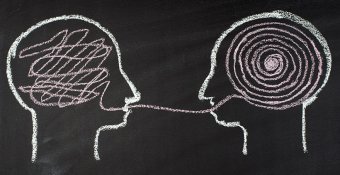by Breanna Bowman
During the seventh-grade, Dr. Stacie Raymer realized she wanted to help people with speech and hearing impairments. Her inspiration was personal, as she grew up watching her deaf sister undergo speech-language therapy.
After Raymer was accepted into graduate school at the University of Florida, she experienced working with a patient recovering from a stroke patient at the VA hospital in Gainesville, FL. There, she was introduced to aphasia and found her passion for this complex disorder.
Since then, Raymer has dedicated her professional career for more than 35 years to improving the language treatments provided to individuals with neurologic disorders. Currently, she is a professor and department chair of Communication Disorders and Special Education in the Darden College of Education and Professional Studies at Old Dominion University.
Recently, Raymer was the recipient of a 2018 Outstanding Alumni Award by her alma mater, the University of Florida College of Public Health & Health Professions. The award recognizes her scholarly research examining methods to optimize rehabilitation of communication impairments in individuals recovering from a stroke.
As part of the event recognizing award recipients, Raymer presented a talk, entitled, "Principles of Neuroplasticity in Aphasia Rehabilitation" with former doctoral student Dr. Amy Rodriguez, now at Emory University in Atlanta.
"My patients do not have healthy brains; they have brains that have a stroke in a very strategic place that are supposed to aid speech and language," said Raymer. "So, in my research, we are investigating innovative ways to engage other parts of the brain in the rehabilitation process."
Aphasia, which affects the left cortex of the brain, is often caused by a stroke. It is a language difficulty that also typically includes dyslexia and dysgraphia, acquired reading and spelling impairments. Patients have difficulty retrieving words and constructing sentences to express their wants and needs, and oftentimes they are not able to understand what they are hearing.
"My research has been guided by principles of neural plasticity to determine ways to engage the brain and maximize its improvements in the rehabilitative process," adds Raymer. "These findings influence the day-to-day decisions of speech pathologists in clinical practice."
Neuroplasticity is an objective term that experts use when describing how the brain changes and adapts over the course of a person's life in response to daily experiences. Neuroplasticity allows the cells in the brain to compensate for an injury or disease and adjust to the changes in their neural connections and networks such as not having access to the left cortex of the brain. Rehabilitation is extremely important in these cases and Raymer's research impacts how speech pathologists diagnose, treat, and practice in the future.
According to Raymer, the evidence suggests that "as we continue to age our brains continue to learn, maybe not as efficiently, but our brain still continues to learn." Additionally, "use it or lose it" is a true principle of the brains plasticity in rehabilitation by speech-language pathologists.
Raymer is a Fellow of the American Speech Language Hearing Association and previous president of the Academy of Neurologic Communication Disorders. Her research has been supported by the National Institute on Deafness, the Department of Defense and other Communication Disorders Associations. She has published more than 75 papers and chapters and has given hundreds of talks nationally and internationally on her research.




